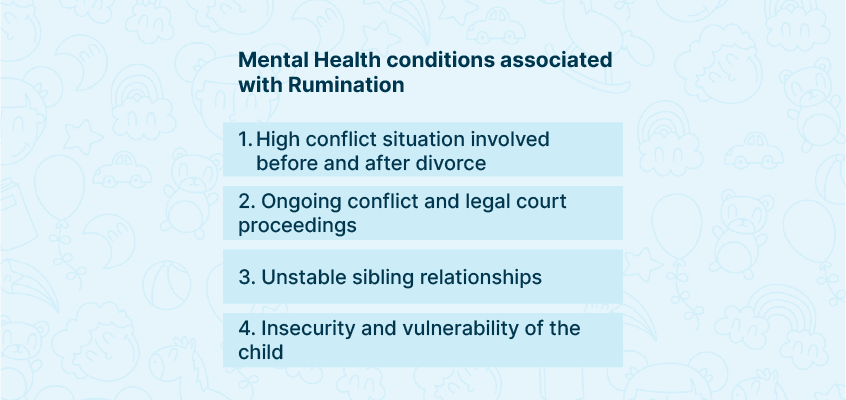Intro:
Obsessive-compulsive disorder(OCD) often causes ruminating thoughts. Rumination is nothing but going over the same thoughts over and over. The pattern of contemplating ideas in OCD is often associated with negative thoughts such as something terrible happening.
Going over these stressful thoughts causes excessive worry and stress. Researchers and behaviour psychologists have developed numerous techniques that help you break the vicious cycle of overthinking dominated by negative thoughts. But first, let’s understand the nature of rumination OCD and ruminating thoughts.

Our Wellness Programs
What is rumination OCD?
There are many forms of OCD, and rumination is present across most states. Having repetitive negative thoughts is the primary feature of rumination OCD that puts tremendous psychological pressure on a patient’s life. Ruminating thoughts create hindrance and negatively impacts a patient’s ability to carry out crucial tasks.
Looking for services related to this subject? Get in touch with these experts today!!
Experts

Kirti Bajpai

India
Psychologist
Experience: 5 years

Neelam Parwani

India
Life Coach
Experience: 5 years

Mansi Chawla

India
Psychologist
Experience: 12 years

Sapna Zarwal

India
Psychologist
Experience: 19 years

Deepti Gandhi

India
Life Coach
Experience: 6 years

Zabby Sharma

India
Life Coach
Experience: 11 years
Here are some examples of ruminating thoughts:
- Obsessive thoughts about maintaining cleanliness
- Thoughts about contamination, a feeling of catching an illness through contamination
- Constant thoughts about potential harm from environmental toxic substances
- Indulging in revisiting past events or memories
- Bad thoughts about something unfortunate may happen
- Thoughts about fear of hurting someone
- Thoughts about being perfect
- Obsessions that are philosophical or metaphysical
Specific stressors may cause rumination OCD such as trauma, failed relationships, problems of self-esteem, the possibility of stressful events such as exams, awaiting medical tests, or any life-changing event.
Intrusive vs Ruminating thoughts:
Obsessions and rumination may appear similar. However, it is marked by the difference of having a choice. In case of obsessions, intrusive thoughts may feel like you may not have any control over them. While in rumination OCD, you have a choice in thinking. The reason why rumination and obsessions may feel similar is that rumination is often associated with negative thoughts.
Mental health conditions associated with rumination:
Many mental health conditions are linked with rumination and the rumination of OCD. Ruminating thoughts contribute to these conditions.
Anxiety:
Those with anxiety disorders tend to think about fears or stressful events that may cause them to worry. In anxiety, a person may fear or dread specific events like exams, interviews, or generalised anxiety.
Depression:
Depression is associated with the themes of worthlessness. Those who suffer from depression are likely to have unworthy, obsessive negative thoughts about their future and the world.
Obsessive-Compulsive Disorder (OCD):
Those who experience OCD may ruminate on fears and feel overwhelmed with negative thoughts about anything that could go wrong. Intrusive thoughts are responsible for compulsive behaviours in people with OCD.
Schizophrenia:
Those who have Schizophrenia ruminate on unusual thoughts, fears, or hallucinations.
Effective tips for managing rumination OCD:
Be mindful of your thoughts:
Mindfulness techniques are popular in managing mental conditions associated with anxiety, OCD, fears, and phobias. Mindfulness techniques such as paying attention to your thoughts, focusing on breathing, consciously observing your thoughts, emotions, and feelings can be helpful to enhance awareness and guide you to identify the triggers or stressors that contribute to rumination OCD. These techniques help break the vicious loop of negative overthinking and enable you to create new thought patterns that are beneficial to keep your mental health in check.
Use the art of distraction:
Distraction may sound like a negative word. But in the case of rumination OCD, it is what you need. To break the repetitive thought patterns, you can use distraction to your benefit. Looking around and finding something to divert your mind from ruminating thoughts may include,
-1. Talking to your loved ones
-2. Having a conversation with your friend
-3. Engaging in a hobby such as art, painting, drawing, music
-4. Reading an interesting book, solving a puzzle
-5. Exercises, Yoga
-6. Fun activities
-7. Watching your favourite series or a movie
Create new patterns by understanding yourself:
Breaking away from repetitive stressful thought patterns is crucial for rumination OCD. To achieve that, you must create a plan to address your ruminating thoughts. The planning begins with setting realistic goals. Having unrealistic expectations and goals can make it challenging to break rumination patterns. Setting achievable goals can encourage your journey to break negative thought patterns. Once you have plans in place, list down potential stressors and triggers, make a journal that helps you understand how these triggers affect you. After identifying this, you can find out ways to avoid them.
Make time for meditation:
Meditation is a powerful way to reduce anxiety and stress. It helps to manage rumination as meditation is known to declutter your mind. With regular practice, you can calm your mind and attain mindfulness. Whenever you experience any negative thoughts, just sit in a relaxed position and focus on breathing. It also regulates your mood and increases productivity.
Try therapies:
If rumination OCD takes away your mental peace and productivity, it is best to talk to a therapist. Many effective therapies have proven to be helpful in case of rumination OCD. Some of them are as below:
- Cognitive behaviour therapy (CBT): CBT is a powerful tool for dysfunctional thinking patterns. It helps to substitute your negative thinking patterns with positive ones.
- Mindfulness-based behaviour therapy: This type of therapy focuses on mindfulness and behaviour modification aspects. By creating an observant attitude towards your thoughts and distressing feelings, a therapist helps to increase your awareness.
- Exposure and Response Therapy (ERP): ERP is a popular therapy for OCD and repetitive thoughts. With this therapy, you can manage anxiety and compulsive behaviours. An experienced therapist helps to reduce your anxiety by systematically exposing you to the triggers. This therapy aims to change your response patterns towards negative thoughts and reduce anxiety.
OCD rumination can have an impact on every area of your life. If you are suffering from repetitive negative thinking patterns and losing your productivity, it is best to seek help from a team of experts. United We Care is a safe online mental health platform where you can get best-in-class support at your convenience.














